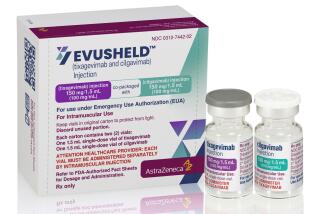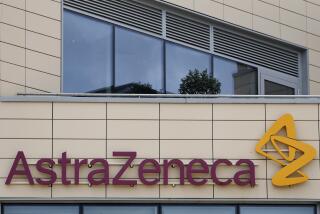Use of AZT by 6,000 AIDS Victims OKd : Promising Drug to Be Available to Half of Those With Disease
- Share via
WASHINGTON — The Food and Drug Administration announced Tuesday that it has approved the expanded use of azidothymidine, a promising new AIDS drug, for AIDS patients who have recovered from pneumocystis carinii pneumonia, one of the opportunistic infections frequently associated with the deadly disease.
The FDA decision cleared the way for plans by federal health officials, announced last week, to make the drug available to an estimated 6,000 AIDS patients who are believed to have suffered bouts of the parasitic respiratory infection. They represent slightly more than half of the approximately 11,000 acquired immune deficiency syndrome patients in the country.
Approval Accelerated
The FDA accelerated the agency’s usual drug approval process, which typically involves several years of limited studies on humans before a drug becomes widely available.
FDA Commissioner Frank E. Young promised that he would apply the same speed to other potentially valuable AIDS drugs, saying they would be given “the highest priority by our review units.”
“Our pledge is to turn these around as fast as we can,” Young said in an interview. “I am really pleased it was possible to recognize the potential of the drug and approve it for treatment use at the earliest possible moment.” Young said he had designated a new internal agency classification of “1AA” for AZT and other AIDS drugs. Until now, the FDA system gave its highest priority to drugs rated 1A.
Federal health officials decided to make the drug more accessible to other AIDS patients after early studies indicated that it was prolonging the lives of those receiving it. In the tests, there was one death among 145 patients given AZT and 16 deaths among 137 patients receiving a placebo.
To receive AZT, which is expected to be commercially available by January, patients must have “adequate” liver and kidney function and “sufficient” red and white blood cell counts to ensure against potentially adverse side effects, according to the drug’s manufacturer, Burroughs Wellcome Co. of Research Triangle Park, N.C. The drug’s side effects include nausea, headache and a reduction of white and red blood cells.
Further, the company said, patients may not be participating in studies of other experimental AIDS drugs and may not be receiving drugs for any other condition associated with AIDS, such as Kaposi’s sarcoma, a rare capillary cancer. Also, the company said, patients on cancer chemotherapy or who are taking drugs that affect kidney function or bone marrow production will not be eligible.
“The idea is to avoid drug interaction that could be harmful,” said Kathy Bartlett, a Burroughs Wellcome spokeswoman.
Children Not Eligible
The company said the drug will not be given to children under the age of 12, pregnant women, nursing mothers or women of childbearing age who are not using contraception or refraining from sexual activity.
“These criteria were developed based on the knowledge available to date about the benefits and risks to a particular group of patients who were studied . . . “ said Dr. Dannie King, director of the department of infectious diseases at Burroughs Wellcome Co.
The company urged patients and physicians interested in additional information about the drug to call a toll free telephone number established for that purpose: 800-843-9388.
AIDS destroys the body’s immune system, leaving it powerless against certain cancers, neurological disorders and otherwise rare infections.
More to Read
Sign up for Essential California
The most important California stories and recommendations in your inbox every morning.
You may occasionally receive promotional content from the Los Angeles Times.













